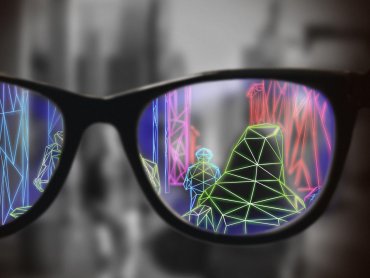
- A-
- A
- A+
Augmented reality glasses may help people with low vision better navigate their environment
Glasses enhance mobility and function in patients who have difficulty with peripheral vision or seeing in low light.
Nearly one in 30 Americans over the age of 40 experience low vision -- significant visual impairment that can't be corrected with glasses, contact lenses, medication or surgery.
In a new study of patients with retinitis pigmentosa, an inherited degenerative eye disease that results in poor vision, Keck School of Medicine of USC researchers found that adapted augmented reality (AR) glasses can improve patients' mobility by 50% and grasp performance by 70%.
"Current wearable low vision technologies using virtual reality are limited and can be difficult to use or require patients to undergo extensive training," said Mark Humayun, MD, PhD, director of the USC Dr. Allen and Charlotte Ginsburg Institute for Biomedical Therapeutics, codirector of the USC Roski Eye Institute and University Professor of Ophthalmology at the Keck School.
"Using a different approach -- employing assistive technology to enhance, not replace, natural senses -- our team adapted AR glasses that project bright colors onto patients' retinas, corresponding to nearby obstacles," Humayun said.
Patients with retinitis pigmentosa wore adapted AR glasses as they navigated through an obstacle course based on a U.S. Food and Drug Administration-validated functional test. Using video of each test, researchers recorded the number of times patients collided with obstacles, as well as the time taken to complete the course. Patients averaged 50% fewer collisions with the adapted AR glasses.
Patients also were asked to grasp a wooden peg against a black background located behind four other wooden pegs without touching the front items. Patients demonstrated a 70% increase in grasp performance with the AR glasses.
"Patients with retinitis pigmentosa have decreased peripheral vision and trouble seeing in low light, which makes it difficult to identify obstacles and grasp objects. They often require mobility aids to navigate, especially in dark environments," said Anastasios N. Angelopoulos, study project lead in Humayun's research laboratory at the Keck School.
"Through the use of AR, we aim to improve the quality of life for low vision patients by increasing their confidence in performing basic tasks, ultimately allowing them to live more independent lives," Angelopoulos says.
Similar News
Links



 Elm TV
Elm TV
 Photo
Photo
 Video
Video





